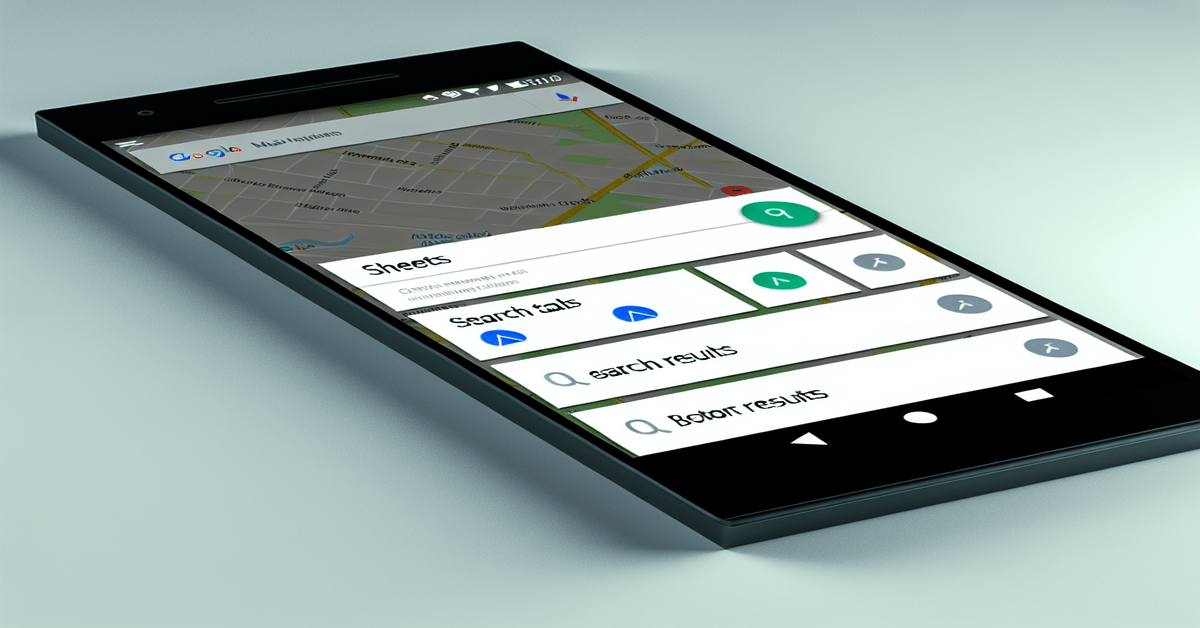Google Maps for Android Set to Revolutionize User Experience with New ‘Sheets’ Interface
Google Maps, the go-to navigation app for millions of Android users, is on the verge of a major redesign that promises to redefine the way we interact with the application. According to a recent article by 9to5Google, the upcoming update will introduce a new interface element called “sheets,” which is set to streamline navigation and enhance user experience.
Unveiling the Power of Sheets
The concept of “sheets” is not entirely new to Google’s design language. In fact, it aligns perfectly with the company’s **Material Design** principles, which aim to create a consistent look and feel across various Google applications. However, the implementation of sheets in Google Maps takes things to a whole new level.
Essentially, sheets are bottom sheets that slide up from the bottom of the screen, providing users with quick access to a wide range of features and information. This innovative approach to interface design is expected to revolutionize the way we navigate through the app, making it easier than ever to find what we need without having to dive deep into multiple screens.
Simplifying Navigation, Enhancing Usability
One of the primary goals of the redesign is to simplify navigation within the Google Maps app. Over time, as new features and functionalities have been added, the app has become increasingly cluttered, making it harder for users to find what they need quickly. The introduction of sheets aims to tackle this issue head-on.
By housing various features and interactive elements within easily accessible sheets, Google Maps will provide a more intuitive and seamless user experience. Whether you’re searching for a specific location, looking for directions, or exploring place details, all the information you need will be right at your fingertips.
Consistency is Key
Google’s decision to incorporate sheets into the Google Maps redesign is not only about enhancing usability but also about maintaining consistency across its ecosystem of applications. With the rise of **Material Design**, users have come to expect a certain level of familiarity and coherence when interacting with Google’s products.
By adopting the sheet-based interface in Google Maps, Google is ensuring that users feel right at home while navigating through the app. This consistency in design language will make it easier for users to transition between different Google applications, reducing the learning curve and increasing overall satisfaction.
The Future of Google Maps
The upcoming redesign of Google Maps for Android is a testament to Google’s commitment to continuously improving its products and delivering the best possible user experience. As technology evolves and user expectations grow, it is crucial for companies like Google to stay ahead of the curve and anticipate the needs of their users.
The introduction of sheets in Google Maps is just one example of how Google is pushing the boundaries of app design and interaction. By **simplifying navigation**, **enhancing usability**, and **maintaining consistency**, Google is setting a new standard for what users can expect from their mobile applications.
As the rollout of the redesigned Google Maps app approaches, it will be interesting to see how users respond to the changes. Will the sheet-based interface prove to be a game-changer in terms of usability and user satisfaction? Only time will tell, but one thing is for certain: Google Maps is poised to redefine the way we navigate and interact with the world around us.
Embracing the Change
As with any significant update to a widely used application, there may be a period of adjustment as users familiarize themselves with the new interface and features. However, the long-term benefits of the Google Maps redesign are likely to outweigh any initial concerns or challenges.
By embracing the change and taking the time to explore the new sheet-based interface, users will quickly discover the advantages it offers in terms of accessibility, ease of use, and overall efficiency. As more and more users adopt the redesigned app, it is likely to set a new standard for navigation apps across the industry.
The Bottom Line
The upcoming redesign of Google Maps for Android, with its introduction of the innovative “sheets” interface, is set to revolutionize the way we interact with the app. By simplifying navigation, enhancing usability, and maintaining consistency with Material Design principles, Google is once again demonstrating its commitment to delivering the best possible user experience.
As the launch of the redesigned app draws closer, it is an exciting time for Android users and the tech community as a whole. The introduction of sheets in Google Maps is not just about improving a single app but about pushing the boundaries of what is possible in terms of app design and interaction.
So, whether you’re a frequent Google Maps user or simply someone who appreciates innovative technology, keep an eye out for the upcoming update. Embrace the change, explore the new interface, and discover how the redesigned Google Maps can help you navigate the world like never before.
#GoogleMaps #AndroidRedesign #MaterialDesign #UXDesign #AppInnovation
-> Original article and inspiration provided by Abner Li
-> Connect with one of our AI Strategists today at ReviewAgent.ai


